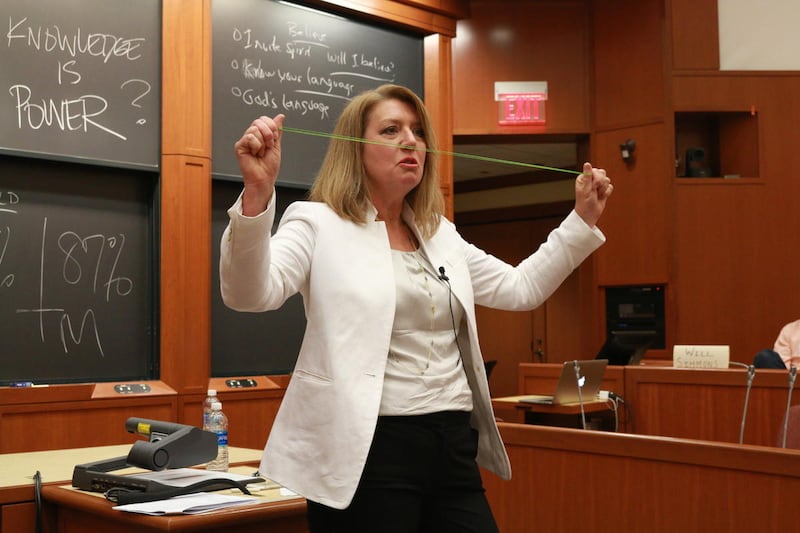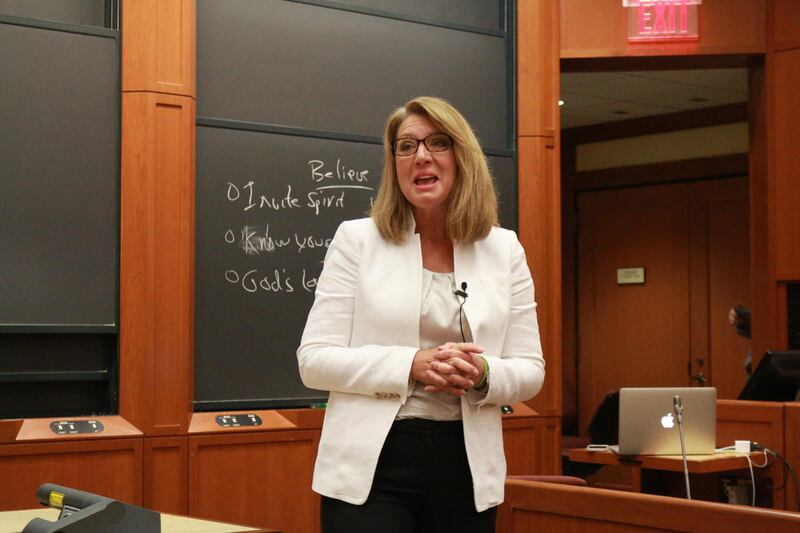Apple, Nike, eBay, Disney and Facebook are only a few of the Fortune 500 companies who have hired Liz Wiseman, an LDS mom and president of the Wiseman Group, to teach leadership strategy.
Wiseman, who is widely regarded as an expert on leadership, is slated to speak at RootsTech and she recently spoke with the Deseret News about how her strategies for creativity, learning and leadership have been influenced by her experiences as a member of The Church of Jesus Christ of Latter-day Saints. From the church’s structure with church callings to growing up in a part-member family, Wiseman doesn’t shy away from discussing her faith’s effect on her career.
“My faith has helped me to see. It’s given me an interpretive lens on my research, and it’s helped me to find some deeper principles that go behind management techniques,” said Wiseman in an interview with the Deseret News.
Liz Wiseman lectures on “the rookie mode,” a concept she developed that proposes that people perform at their best when they are in a learning state. And while she has seen evidence of the validity of this principle in corporations throughout the world, Wiseman, who currently serves as an early-morning seminary teacher in California, says this leadership strategy is also manifest in the church calling system.
“There’s no kind of learning greater than the learning that comes when you have to teach the next day,” she said.
Wiseman says that new callings put the whole membership into rookie mode.
“What happens at the time you’ve just figured out how to master your calling?” asked Wiseman. “Just at the very moment you get good, what happens? They give you a new calling!”
However disgruntled members may be about losing a favorite calling, Wiseman said that they still appreciate the challenge of a new one.
“I think we love it not because it’s fun to not know what we’re doing, I think we love the growth that comes when we tackle something that’s a little bit bigger than us,” said Wiseman.
Because of what Wiseman described as a “wickedly brilliant system,” members are encouraged to be in a constant state of learning when they are assigned new callings.
Through teaching seminary, Wiseman says she has learned that callings cause us to think innovatively and that when we are not fully confident in our abilities, we learn more.
“It creates this humble, hungry way of going about it,” said Wiseman, and that is what she hopes to teach at RootsTech.
Wiseman goes as far as to suggest it would be beneficial for companies to introduce a similar system.
“I actually think if corporations out in the business world adapted this same kind of system, amazing things would happen,” said Wiseman.
Throughout her career in the corporate space, Wiseman said she earned respect while being very vocal about her faith and priorities.
“I think we respect men and women who decide to put their family first or their faith first. I have found that when you kind of own that, people sense the authenticity,” she said.
This is what led Wiseman to once show the audacity to tell her boss that her job was second on her list of priorities. She said that later he became one of the biggest "ambassadors" of her faith and always made sure that she was respected and had enough time for her family and faith.
Wiseman grew up in a strong family and while her father wasn't fully active in the LDS Church, her mother encouraged her in living the gospel.
“I feel like so much of who I am is because I grew up in this part-member family and had to really make choices for myself,” Wiseman said. “I wouldn’t have had it any other way.”
Next week, Wiseman will be one of the keynote speakers at the Innovation Summit at RootsTech. Wiseman plans to teach about the conditions under which brilliance and innovation thrive.
She compares RootsTech to the concept of fellowship within the church. She believes that it is important for people who believe the same things and have the same goals to have an opportunity to share the same physical space. She said that this is “not only to learn from each other but to spark more ideas inside our own heads.
“It’s one thing to work individually and to utilize your own genius, but you know when we look at real innovation, and innovative thinking and products, it is almost always the result of a spark (where) brilliance meets other brilliance,” she said.
Email: bfacer@deseretdigital.com




